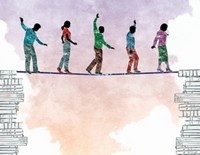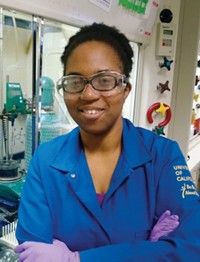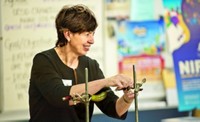Advertisement
Grab your lab coat. Let's get started
Welcome!
Welcome!
Create an account below to get 6 C&EN articles per month, receive newsletters and more - all free.
It seems this is your first time logging in online. Please enter the following information to continue.
As an ACS member you automatically get access to this site. All we need is few more details to create your reading experience.
Not you? Sign in with a different account.
Not you? Sign in with a different account.
ERROR 1
ERROR 1
ERROR 2
ERROR 2
ERROR 2
ERROR 2
ERROR 2
Password and Confirm password must match.
If you have an ACS member number, please enter it here so we can link this account to your membership. (optional)
ERROR 2
ACS values your privacy. By submitting your information, you are gaining access to C&EN and subscribing to our weekly newsletter. We use the information you provide to make your reading experience better, and we will never sell your data to third party members.
Careers
Robert Dynes
New University of California president grapples with budget woes, lab management
by ELIZABETH K. WILSON, C&EN WEST COAST NEWS BUREAU
July 19, 2004
| A version of this story appeared in
Volume 82, Issue 29
When Robert C. Dynes took over as president of the University of California last October, he inherited an institution in turmoil. One of the largest, most influential, and prestigious public university systems in the country, UC has taken a number of nasty hits in the past year, from drastic funding cuts to the prospect of losing its long-held contracts for managing three national labs.
Since UC's inception in 1869, its mission has been to provide inexpensive, high-quality education to California residents. In 1960, UC adopted a master plan guaranteeing UC admission to the top 12.5% of California high school students. And with 10 campuses, more than 200,000 students, and 9,300 faculty--45 of whom have won Nobel Prizes--UC has been a leader, particularly in science and engineering.
But the promise of accessible education is becoming harder to keep. For the past several years, the university's budget has been cut while enrollment has increased. And this year, California's notorious $15 billion budget deficit has resulted in cuts in government funding for UC. That, in turn, has led to a dramatic 14% jump in resident student fees, and faculty and staff salaries remain depressed.
Furthermore, for the first time since adopting the 1960 master plan, eligible high school graduates--7,600 in all--were denied admission as freshmen for fall 2005. They were guaranteed admission as juniors in 2007 after two years of community college, but most have rejected that offer.
UC's science departments are also feeling the pinch, worrying about the future of their labs and their students (C&EN, Aug. 11, 2003, page 26).
And finally, numerous financial scandals and allegations of mismanagement have plagued Los Alamos National Laboratory, which UC has managed since the lab opened 60 years ago. As a result, the Department of Energy is putting management contracts for all of the national labs--including the UC-managed Lawrence Live rmore and Lawrence Berkeley National Laboratories (LBNL)--up for bid. The potential loss of this long-standing relationship has many science faculty worried.
But Dynes, 61, has bold plans for UC. From his office in Oakland, he talked with C&EN about his strategies for coping with the budget crisis, including a controversial agreement with California Gov. Arnold Schwarzenegger on UC funding levels; Dynes's own enthusiasm for industrial collaborations and for UC's alliance with the national labs; and his focus on encouraging women and minorities in science.
Dynes brings to the presidency 20 years' experience as a physicist at Bell Labs and 14 years as a physics professor at UC San Diego, eight of which he served as chancellor. Though his field is condensed-matter physics, particularly superconductivity, Dynes made his mark as chancellor at UCSD by nurturing the campus's reputation as a haven for scientific and medical start-up companies and industrial collaborations while remaining, in his words, "a passionate scientist."
When the past UC president, cognitive psychologist Richard C. Atkinson, stepped down after eight years, Dynes was selected from a pool that included the chancellors of UC Santa Barbara and UC Los Angeles. Dynes accepted, and now he and his wife, Frances Hellman, who is also a physics professor at UCSD, are moving their labs to the Berkeley campus.
THE BUDGET was one of the first major challenges facing Dynes as president. A troubling result of reduced funding has been the erosion of UC's competitive edge. "Our faculty and staff salaries have been slipping relative to the market," Dynes says. Other institutions have been "trolling California to find faculty that are movable"--that is, who can be attracted away from UC.
The student-to-faculty ratio has also been drifting up, partly because UC has instituted hiring freezes as the student population is growing. "That means undergraduates have less chance to work in people's labs," he says.
With serious cutbacks a certainty, Dynes, along with Charles B. Reed, chancellor of the large California State University system, signed a compact with Schwarzenegger that calls for steep cuts in state funding for UC--7.9%, or $228 million, in the coming year--but promises some increases in the subsequent six years.
The agreement provoked an outcry from some California politicians and students, who charged that it was made behind closed doors and unfairly targets students. But Dynes believes the agreement will ultimately save UC from its precarious position.
Though student fees will continue to increase, 8% for each of the next two years, the governor's compact calls for future funding increases for faculty and staff salaries and includes increased funding to accommodate student population growth at the rate of 5,000 per year. That, Dynes says, should restore UC's long-held top-12.5%-admission guarantee.
Where might this extra funding come from? "I don't think even the governor can answer that," he says. Like many others, Dynes is betting that California's economy will improve. If not, he says, "well, then the governor has several options. He's been pretty creative in finding sources of revenue, or he may ultimately raise taxes."
The national labs are a sore point. Dynes isn't thrilled by the prospect of having to prepare bids for the lab management contracts, at a cost of up to $5 million per bid, during UC's budget crisis.
DOE's decision to put the contracts up for bid, forcing UC to compete for the labs it has managed for decades, wasn't warranted, Dynes believes. "There were issues in operations that showed some places where we weren't paying attention," he says, "and we have paid much more attention to those areas and corrected a lot of the issues. In terms of science and technology in those labs, we have been successful, and those labs have been successful. I wouldn't want to tamper with that."
What are the prospects for the future of UC science if the university loses a national lab contract? Dynes, who long served as a consultant to various lab committees, sidesteps that question. "My real concern," he says, "is that if we were not the contractors, who would be?"
The University of Texas is frequently cited as a potential bidder for Los Alamos. A corporation could also enter the bidding game, a prospect Dynes doesn't relish. "If we're competing with industry, I don't think it's a level playing field."
Partnering with a corporation might be another option. "It is true that corporations can bring expertise in operations areas that we're not especially talented at," he notes. "What we bring to the table are extremely strong science and technology standards and interests."
UC seems to be positioning itself, at the very least, to make a strong bid for LBNL, which sits just up the hill from the UC Berkeley campus. UC recently appointed Stanford University physics professor and Nobel Laureate Steven Chu as director, in part to cement UC's role in maintaining and raising the lab's status.

DYNES SEES a collaborative future for UC science. For example, industry provides one possible, if controversial, source of funding for research. University agreements with industry are becoming more common, as illustrated by the arrangement between biotech giant Syngenta and the department of plant and microbial biology at UC Berkeley. In return for $25 million over five years, the department would give Syngenta--Novartis when the deal was made in 1998--first crack at 30 to 40% of the discoveries the department members made. That caused concern among some faculty, who worried about maintaining academic integrity.
But Dynes believes that industry par tnerships with university researchers are beneficial. "They're very stimulating," he says. "Companies bring to universities a wealth of problems to be solved, creating an environment where faculty can pick and choose the problems that fascinate them. We're richer for it," he says.
As for safeguards to academic integrity, "We have to constantly watch those. I think they are [in place]," he says. "I know they are at the San Diego campus, because I oversaw those personally. We had independent individuals or groups that watched those conflicts so people didn't inadvertently get themselves over the line. On the other hand, when we do have those transfers of intellectual knowledge, we create things we otherwise couldn't possibly create."
Dynes also gets fired up about the perennial issue of encouraging minorities and women in scientific careers. "We've thrown away over half the population as scientists," he says. "It's not quite as bad in chemistry and biology, but it's awful in physics and some engineering disciplines."
The problem needs to be addressed much earlier in a person's life, he believes. "The answer doesn't go back to trying to recruit women and minorities to faculty positions. I don't think it goes back to trying to recruit women and minorities to graduate school. I think it goes back to kindergarten," he says.
"I believe that we have not instilled the fascination and love of science in young children, and that comes back to grade school and high school teachers," he says. "If there's one thing in this whole area that I would like to accomplish, that would be to implant science and math teachers--all races, all genders--in the state of California who are educated at UC. If we do that, that's the first step toward correcting a systemic problem."
To that end, Dynes is spearheading an effort to encourage UC science students to become science teachers. "We want to create a master's curriculum that is not a default for not getting a Ph.D.," he says. That might include, for example, provisions for students to begin accreditation in summer, so they don't have to add another year to their schooling.
He again sees industry as a possible source of collaboration. He'd also like to see an arrangement in which teachers might work for a company during the summer months, allowing them to continue to upgrade their scientific skills and giving them enough income to make a teaching career attractive, he says.
Dynes may have limited leisure time, but he and his wife are avid baseball fans and rooted for the Padres while they were in San Diego. Now, they live in a location with two teams: the San Francisco Giants and the Oakland A's. They haven't yet decided which to align themselves with. "It could well be that because one's an American league team and one's National, I won't have to make a decision," he says.









Join the conversation
Contact the reporter
Submit a Letter to the Editor for publication
Engage with us on Twitter